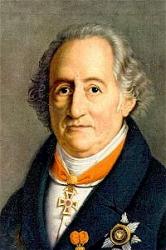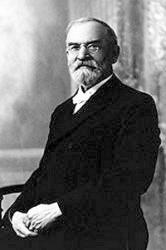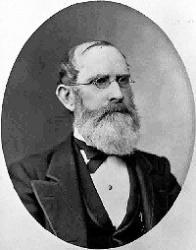Planning worship?
Check out our sister site, ZeteoSearch.org,
for 20+ additional resources related to your search.
- |
User Links
Person Results
‹ Return to hymnal




Export as CSV
Mrs. E. C. Ellsworth
Person Name: E. C. Ellsworth Hymnal Number: d162 Author of "Will Jesus find us watching" in Songs of the Soul Late 19th Century
Mrs. E. C. Ellsworth
J. W. von Goethe

1749 - 1832 Hymnal Number: d122 Author of "Purer yet and purer I would be in mind" in Songs of the Soul Goethe, Johann Wolfgang von, son of Johann Caspar Goethe, a lawyer at Frankfurt-am-Main; was born at Frankfurt Aug. 28,1749, and died at Weimar, March 22, 1832. The greatest German poet of his day, and one of the most famous literary men of his own or any age, his sympathies were Classical rather than distinctively Christian; and as he himself said (Conversations with Eckerman, January 4, 1827), he wrote no poems suited for use in public worship.
A few pieces, principally from his well-known dramatic poem of Faust (pt. i. 1808; pt. ii. pub. posthumously, 1832), are found under his name in one or two Unitarian hymn-books. Good translations of both parts of Faust have been published by Dr. John Anster, Bayard Taylor, Sir Theodore Martin, and others; while a very large number of other persons have published translations of the first part. No attempt has accordingly been made to notice any translations except those in the hymn-books.
i. From Faust, pt. i., 1808.
i. Christ ist erttanden! Freude dem Sterbliche. Easter. The chorus of angels on Easter Day. Translated as “Christ has arisen! Joy to our buried Head," by Dr. F. H. Hedge, in his Supplement to Hymns for the Church of Christ, Boston, U.S., 1853, No. 836. A free version is also noted under A. C. Cox, No. 4.
ii. Die Sonne tönt nach alter Weise. Praise. The Song of the three Archangels in the Prologue in Heaven. Translated as "The sun is still for ever sounding," by Dr. F. H. Hedge, as above, 1853, No. 190.
iii. Verlassen nab ich Feld und Auen. [Evening]. Faust's Soliloquy on entering his study with the dog, Translated as "O'er silent field and lonely lawn," as No. 21 in W. J. Fox's Hymns & Anthems, 1841, repeated in English and American Unitarian collections.
ii. Miscellaneous.
iv. Des Maurers Wandeln. Written for the Freemasons' Lodge at Weimar, of which he became a member in 1780, and included in his Werke, 1828, vol. iii. p. 61, entitled "Symbolum." Translated as "The Mason’s ways are A type of Existence," by T. Carlyle, in his Past and Present, 1843, p. 318. Included,beginning "The future hides in it" (st. ii.), as No. 854 in Dr. Hedge's Collection, 1853, as above.
Two pieces are also found in collections under his name, viz.:—
1. Without haste! without rest, in Hymns of the Ages, Boston, U.S., 3rd Ser., 1865, p. 76, and repeated as "Without haste and without rest," in Stopford Brooke's Christian Hymns, 1881, &c. It is suggested by " Wie das Gestern Ohne Hast, Aber Ohne Hast, Drehe sich jeder, Urn die eigne Last," in Goethe's Zahme Xenien, 2nd Ser., 1823 (Werke, 1828, iii. p. 245).
2. Rest is not quitting The busy career. [Rest]| This is part of a piece beginning "Sweet is the pleasure Itself cannot spoil." No. 853 in Dr. Hedge's Collection, 1853, as above, marked as by " J. S. Dwight." There does not appear to be any equivalent poem in Goethe's Werke. [Rev. James Mearns, M.A.]
--John Julian, Dictionary of Hymnology, (1907)
===========================
Goethe, J. W. von, p. 441, i. The Exeter Unitarian Hymns, Psalms and Anthems, of 1863 and 1884, contains the several additional hymns from Goethe, the translations in each case being by the Rev. T. W. Chignell. Some of the versions are very free, and the distinctively Christian character of the translations is only very faintly present in the originals. [Rev. James Mearns, M.A.]
--John Julian, Dictionary of Hymnology, Appendix, Part II (1907)
J. W. von Goethe
Mrs. Vokes
Hymnal Number: d132 Author of "Soon may [shall] the last glad song arise" in Songs of the Soul Pseudonym. See also
Mrs. Vokes
T. J. Judkin

1788 - 1871 Person Name: Thomas J. Judkin Hymnal Number: d44 Author of "Holy Spirit, fount of blessing" in Songs of the Soul Judkin, Thomas James, M.A., son of a London tradesman, was born at London, July 25, 1788, and was educated at Caius College, Cambridge (B.A. 1815, M.A. 1818), mainly at the expense of Sir William Curtis, an alderman of the City of London. After taking Holy Orders in 1816, he held various curacies, until 1828, when he was preferred as minister of Somers Chapel, St. Pancras, London. He died Sept. 11, 1871. He published Twelve Signs of the Times; Popish Aggression; and other works, including a volume of sonnets as Bygone Moods. His hymns were published mainly for the use of his own congregation and appeared as:—
(1) Church and Home Psalmody; being a Collection of Psalms from the Old and New Versions, and Original Hymns, for Congregational and Domestic Purposes, 1831. In 1834 this was enlarged and issued as (2) Church and Home Melodies, being a New Version of the more devotional parts of the Psalms, together with a Version of the Collects, and Original Hymns; for Congregational and Domestic purposes. This was divided into (1) "Spirit of the Psalms." (2) "Collects in Verse." (3) "Hymns on the Gospels," and (4) "Original Hymns." (3) The 3rd ed. was published in 1837. At the end of the volume two title-pages were supplied, that the book, if so desired, might be divided into two, one as The Spirit of the Psalter; The Collects in Verse; together with Hymns suggested by the Gospels for the day throughout the Year; and the other, Sacred Melodies; or Original Hymns for Congregational and Domestic Use,
From the 1st ed. of his Collection the following hymns are in common use:—
1. Enthroned is Jesus now. Ascension.
2. Holy Spirit, Fount of blessing. Whitsuntide.
3. How shall I pray, 0 Lord, to Thee. Prayer.
4. We are journeying to a place. Heavenward.
5. When in the dark and cloudy day. Jesus, all in all.
--John Julian, Dictionary of Hymnology (1907)
T. J. Judkin
William Fairfield Warren

1833 - 1929 Person Name: W. F. Warren Hymnal Number: d65 Author of "I worship thee, O Holy Ghost" in Songs of the Soul Warren, William Fairfield, D.D., was born at Williamsburg, Massachusetts, in 1833, and graduated at the Wesleyan University in 1853. After spending some time in Germany, he was appointed Professor of Systematic Theology in the Methodist Episcopal Mission Institute at Bremen, in 1861. Returning to America in 1866, he held some important appointments there, ultimately becoming President of Boston University, in 1873. His hymn, "I worship Thee, O Holy Ghost" (Whitsuntide), was contributed to the American Methodist Episcopal Hymnal, at the request of the editorial committee, in 1877, and was published therein in 1878. It has passed into other collections.
-- John Julian, Dictionary of Hymnology (1907)
==========================
Warren, William, D.D. (Williamsburg, Massachusetts, March 13, 1833--December 6, 1929). He prepared for college at East Greenwich Academy, graduated A.B., Wesleyan University, took training at Andover Theological Seminary, and continued his studies at the Universities of Berlin and Halle. He was the recipient of honorary degrees from Boston, Wesleyan, and Ohio Wesleyan Universities. Ordained a Methodist Episcopal minister in 1855, after preaching in Boston for five years he returned to Germany where for a like term of years he was Professor of Systematic Theology at Mission Institute, Bremen, which later became Martin Institute at Frankfort. He returned to Boston to occupy a similar professorship at the Theological Seminary and to become Acting President when the Methodist Biblical Institute moved there from Concord, New Hampshire. His return gave impetus to the plan under way which eventuated the establishment of Boston University in 1869. Becoming President of the University in 1873, he was Dean of its School of Theology, 1903-1911, and made President Emeritus in 1923.
--Robert G. McCutchan, DNAH Archives
William Fairfield Warren
David Denham
1791 - 1848 Hymnal Number: d90 Author of "Home, home, sweet, sweet home" in Songs of the Soul Denham, David, born 1791, was the son of Thos. Denham, a Baptist minister in the East of London. He began to preach when very young, and in 1810 became pastor of the Baptist Church at Horsell Common. In 1816 removed to Plymouth, in 1826 to Margate, and in 1834 to the Baptist Church in Unicorn Yard, Tooley Street, Southward. Ill-health compelled him to resign his charge in London, and he sojourned for a time at Cheltenham and Oxford. He died in 1848 at Yeovil, in Somerset, and was buried in Bunhill Fields Burial Ground, London.
In 1837 he published a collection of hymns, as:—
The Saints' Melody. A New Selection of upwards of One Thousand Hymns, Founded upon the Doctrines of Distinguishing Grace, and adapted to every part of the Christian's experience and devotion in the Ordinances of Christ, &c, 1837. This edition contained 1026 hymns. This number was subsequently increased to 1145 hymns.
This Selection is still in common use in more than one hundred congregations in Great Britain and the colonies. Denham's hymns, all of which are signed "D. Denham," are numerous. There is also one, apparently by his wife, "Mrs. M. A. Denham." Outside of his own Selection his hymns are rarely found. The best known is "'Mid scenes of confusion and creature complaints." [Rev. W. R. Stevenson, M.A.]
-- John Julian, Dictionary of Hymnology (1907)
David Denham
H. Q. Wilson
Hymnal Number: d151 Author of "'Twas Jesus, my Savior, who died on the [a] tree [cross]" in Songs of the Soul
H. Q. Wilson
Thomas C. Upham
1799 - 1872 Hymnal Number: d66 Author of "I would love thee, God and Father" in Songs of the Soul Upham, Thomas Cogswell, D.D., was born at Durfield, New Haven, Jan. 30,1799, and educated at Dartmouth College (1818), and at Andover (1821). Having entered the Congregational Ministry he became Professor of Mental and Moral Philosophy at Bowdon College, in 1825, and retained the same to 1867. He died at New York, April 2, 1872. His publications were numerous and included Mental Philosophy (which was long and widely used); American Cottage Life; a volume of Poems, 1852, &c. Five of his hymns are given, with accompanying dates, in Hymns and Songs of Praise, &c, N. Y., 1874, as follows:—
1. Fear not, poor weary one. Help in Sorrow (1872).
2. Happy the man who knows. Obedience (1872).
3. 0 Thou great Ruler of the sky. Morning (1872).
4. 0 Thou great Teacher from the skies. Following Christ (1872).
5. 'Tis thus in solitude I roam. Omnipresence (1853).
These hymns are limited in their use. In 1847 Upham published the Life and Religious Opinions and Experiences of Madam de la Mothe Guyon. . . Two vols., N. Y. In this work the anonymous translations from Madam Guyon's hymns are found, viz.,
(1) “By sufferings only can we know";
(2) "I would love Thee, God and Father";
(3) "'Tis not [by] the skill of human art." There are also additional translations of two of her hymns in the same work.
--John Julian, Dictionary of Hymnology (1907)
Thomas C. Upham
C. C. Cox

1816 - 1882 Hymnal Number: d129 Author of "Evening shades" in Songs of the Soul Cox, Christopher Christian, M.D., was a Maryland physician, and long prominent in the public service. Born at Baltimore, Aug. 28, 1816, and graduated at Yale College, 1835. He practised medicine in Baltimore, 1838, and in Talbot County, Maryland, 1843. In 1861 he became Brigade Surgeon U. S. A., and resided in Washington. He died Nov. 25, 1882. He was a member of the Protestant Episcopal Church. His hymns in common use are:—
1. Silently the shades of evening. Evening. Written in 1840 or 1846, and published in Woodworth's Cabinet, 1847, with music. It is much used in American hymn-books.
2. The burden of my sins, 0 Lord. Lent. Appeared in the Cantate Domino, Boston, 1859, together with two additional originals and two translations. These hymns are unknown to English collections. [Rev. F. M. Bird, M.A.]
--John Julian, Dictionary of Hymnology (1907)
C. C. Cox
Leonard Marshall
1809 - 1890 Hymnal Number: d7 Author of "Another year has gone" in Songs of the Soul Marshall, Leonard. (Hudson, New Hampshire, May 3, 1809--July 1, 1890, Hudson, N.H.) Baptist. Voice pupil of John Paddon of London and Charles Zenner, harmonist. Tenor soloist of Handel and Haydn Society ca. 1844-1850. Music director at Twelfth Congregational Church, Boston, Massachusetts, 1836-1957; Bowdoin Square Baptist Church, ca.1867-1870; Harvard Street Baptist Church, ca.1870-1875, and other Boston churches. Chorus director at Tremont Temple, 1857-1867. Author of popular songs, "Don't Give Up the Ship" and "The Mountaineer," and of thirteen church music books; published The Sacred Star hymnal, 1861, Boston. Wrote words of Easter hymn commencing, "Jesus Christ, our precious Savior," and hymn "Ever gracious, loving Savior, Come and bless us from on high."
--E.F. Quinn, DNAH Archives
Note: Typewritten copy of obituary from the Boston Evening Transcript 3 July 1890, is in the DNAH Archives.
Leonard Marshall


 My Starred Hymns
My Starred Hymns


